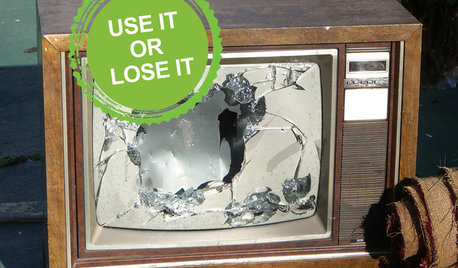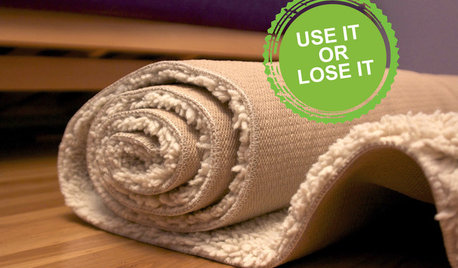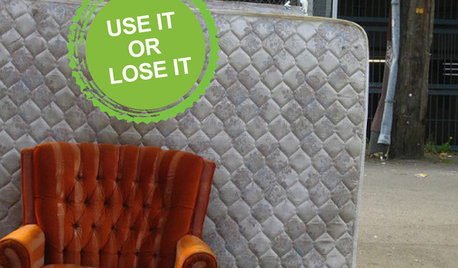Organic way to get rid of aphids?
These red and green aphids just love to cluster around the new shoots and buds on my tomato plants. Is there an organic way to get rid of them? I am experimenting with paw paw (a natural pesticide) by boiling the youngh twigs of paw paw trees. But I thought I should ask if there is an already-tested and proven way to get rid of them without artificial chemicals. Thanks
Comments (47)
jbann23
15 years agoBest way I know is to spray them with a little detergent in water. You can even mix in a little canola oil or olive oil. The mixture stops their ability to breathe. The oil helps it to stick and the detergent makes the water 'wetter' so it penetrates their rotten little lungs. Oh, and back off on your fertilizer. Too much makes the plants more appetizing to pests even though the plants seem to grow like crazy. IMHO I hope this helps ya.
k2marsh
15 years agoYou are supposed to spray the tomatoes with a SOAP spray. NOT a dishwasher liquid. Where do you find soap anymore? Even Ivory Soap is not soap.
Kroger has a hand soap that the ingredients start with soap. So it must be mostly soap.
Test It
Homemade Garden Insecticides
Oil smothers insects, so if you want a good homemade insecticide, combine one tablespoon of canola oil with a few drops of liquid soap and a quart of water. Make sure you use soap and not a product that is not soap.
Spray this homemade garden insecticide on insect infested plants, and dont forget the underside of the leaves where insects can hide.
Reapply this mixture after it rains to kill, and control harmful bugs in the garden.
Use no more than three successive soap sprays on any particular plant.
I am waiting for the hornworms before I spray.
1 TB spoon canola oil.
1 Quart of water.
A few drops of liquid soap.Related Professionals
Windham Landscape Architects & Landscape Designers · Wrentham Landscape Architects & Landscape Designers · Jennings Landscape Architects & Landscape Designers · Frisco Landscape Contractors · Brookfield Landscape Contractors · Fort Atkinson Landscape Contractors · The Crossings General Contractors · Fort Pierce General Contractors · Hayward General Contractors · University Heights General Contractors · Westerly General Contractors · Wolf Trap General Contractors · Coatesville Decks, Patios & Outdoor Enclosures · Kissimmee Decks, Patios & Outdoor Enclosures · Rantoul Decks, Patios & Outdoor Enclosuresdigdirt2
15 years agoAs has been discussed here many times, many of us use Dawn dishwashing liquid, the original not the anti-bacterial, with no problems at all. 1 T in a gallon of water, the addition of oil is optional.
That said, aphids can also just be blasted off the plants with plain water and a hose. It works well. ;)
Dave
trudi_d
15 years agoTake a close look around your garden and see if you notice any ladybugs. I've just seen them first this season today. And the two I found were doing the 'oingo boingo' so in a short time I will have lots and lots of ladybug larvae that will come and eat up any aphids.
catman529
Original Author15 years agojbann23 - thanks for the advice, I'm not using any fertilizer.
k2marsh - thanks, does the dish soap help the oil/water to mix? ps- hornworms won't be a problem for me, I pick them off and rear them to adult moths just for fun. I may want to buy a cheap hybrid plant and give it lots of nitrogen just so I have extra foliage to feed the hornworms when I get them.
digdirt - this sounds like the most simple, and I have tried it once but I don't think I applied enough to kill them all. I will probably just mix some dish soap with water, it seems to be what everyone does for aphids.
trudi_d - I have been meaning to find ladybugs for my garden, but keep forgetting. If I'm not satisfied with dish soap I will just go on a hunt for as many as I can find.
iyengar21
15 years agoNeem oil, from neem leaves, works for aphids and other pest insects. I've used it on aphids that were attacking my flowers last year and it worked like a charm. You can find it at Lowe's or Home Depot.
trudi_d
15 years agoPyrethrin is made from chrysanthemums. Flowers count as organic, right?
No. "Organic" implies that the plants are grown by a set of documented certifiable standards. It has nothing to do with the plants themselves (except that they should be sown from organic certified seeds unless they aren't available--and for certification you need document your attempts at locating the organic seeds if you don't use them), it is how they are grown and how they are processed that define "organic".
maupin
15 years agoGood God. Pyrethrins and neem oil to fight aphids? Don't go squirrel huntin' with a cannon. Ladybugs and a good blast of the hose, coupled with laying off fertilizer, is more than enough to dispense with the aphids. If you must, the dish soap works too. But even that seems a bit excessive.
mickyfinn6777
15 years agoThe easiest way to get rid of all types of aphids and flies,is to grow some cheapo seeds of sweet peppers and Egg plants, then when the plants are about a foot high plant them inbetween your tomato plants or very close to them, they are absolute magnets for all types of aphids and will draw them right off your tomato plants for months, it ruins the pepper and egg plants completely but you save your tomatoes easily, the peppers and egg plants will be absolutely covered in aphids but just leave them to it, with no sprays or anything.
aninocentangel
15 years agoI haven't had to worry about aphids on my tomatoes so far this year. The ants seem to keep them pretty much on my pea plants, and the peas don't seem to care. I have to laugh at the ladybugs, they'll be crawling up a pea stem, almost to the nuggets of aphidy goodness on the backs of the leaves when they suddenly divert onto a nearby unpopulated bean leaf and then they're off for a stroll around the trellis/cage, until they get frustrated about half way around and buzz back to the pea patch to start the whole process over again.
East Lubber nymphs are what's driving me crazy at the moment. They're tearing my garden up. They had the peppers absolutely stripped and they're waging war upon the onions, surprisingly enough. Fortunately the peppers are struggling on, and the onions seem to shrug them off.lee_71
15 years agoFingers work best.
Leave a few for the lady bug larvae and you won't have to
worry about aphids, or your fingers in the future.Lee
k2marsh
15 years agoHi Catman 529,
What ever you use TEST IT before using it on all your tomatoes. Dish Liquid could kill your tomatoes. USE SOAP or leave it out and just use the oil..I washed the aphids off of my tomatoes with a hand spray bottle. Your spray tank would do better. I didnt want to wash my tomatoes away with the hose. We just had a hard rain that washed most the remaining aphids away with the lady bugs.
The lady bugs could not eat all the aphids that I had. In fact I never saw them eating any. They just walk around full of the one aphid they did eat.Last year I picked all the horn worms off my tomatoes.
Karyl
====Flowerhen
15 years agoGarlic Works great for me !! I had about 50 Pineapple sage plants in my greenhouse that were loaded with aphids,,so I sprinkled some garlic powder on them and they jumped ship. You can also put some garlic cloves or minced garlic in about a quart of water and let it sit for several days,,and then use that as a spray. I have had great luck with it. Aphids HATE GARLIC !!!
catman529
Original Author15 years agoI might go and try the pawpaw again...the acetogenins which kill insects are most concentrated in the bark of the twigs...so I boil a bunch of twigs and then put the water/extract it in a spray bottle. I tried this once but barely sprayed any of it, so I will have to try again. Dish soap water didn't have much of an effect, even though I emptied 1/3 of a large Windex bottle of it on my 9 plants.
When I water the plants I make sure they get a good hard spray from the hose, which knocks some of the aphids away, but there are still plenty on there. I just need to kill them without harming the plant or putting harmful substances (aka chemical pesticides) on them. Thanks all for the help, if there are any other remedies I'm open to hearing any...
whizzer75
15 years agoI'm still using Octagon soap spray that I made up several years ago. Shave a bar of Octagon soap into 1 gallon of hot water. Stir until disolved. When it cools it will be thick.Put one cup of this concentrate in a 20 gallon hose end sprayer with water to fill (mix well). I keep a separate sprayer with the solution in it for use when needed.
Seems to work as well as Neem oil and doesn't leave as much residue. I understand Fels-Naptha works as well and is probably easier to find.danincv
15 years agoI use Murphy's Oil Soap- that's a true soap and you should be able to find it almost anywhere- we use it on wood floors and saddles also. Use 1/2 cup Murphy's plus 2 cups rubbing alcohol in a gallon of water and you have a good contact insecticidal soap that works on aphids and scale. For a quart hand sprayer that's 2T Murphy's and 1/2 cup alcohol.
computergardener
15 years agoMarigolds....
I thought this was an old wives tell but decided to try it and wow. I have never had a problem since. I buy a flat at the beginning of the season and put 4-5 around each plant. I like the color it adds also...
Seriously give it a shot.
lisalu
15 years agoOkay, I was wondering about ladybugs since I have them all over my tomatoes. (I never noticed them last year). I also have red "aphids" - I guess that's what they are - under the leaves.
So if I understand correctly the ladybugs are GOOD for my plants? That's great because there are so many of them I was worried whether I needed to get rid of them or not!
oldroser
15 years agoTake it easy on mixing oil into the spray. The correct amount is 1 tablespoon per gallon. You're apt to burn the leaves if you use more. Never had a problem with aphids - ladybugs take care of them before they ever get started. But soapy water is also good and even a blast of cold water from a hose will knock them off without bothering friendly insects. I'm not an organic gardener but I can't remember ever using an insecticide in the vegetable garden. Birds take care of most of the problems and wasps, bats and friendlies finish off the rest.
danincv
15 years agoDo a Google search for Green Lacewings. You will come up with a bunch of sites including the one attached. They are a good natural control of aphids and spider mites.
Here is a link that might be useful: Green Lacewings
evonnestoryteller
15 years agoI know this is the tomato forum, but I thought I would give this a try. This is the most informational spot I have found so far for getting rid of aphids.
My neighbor has a very large snowball bush. It is much taller than I am and probably more than six feet across. It is infested with aphids and covered with rolled leaves. It would be an all day job to cut off all of the rolled leaves! It is my understanding that it is difficult to get any spray into those and knock the aphids out!
I seem to recall when I had a whitefly problem, there was some sort of stuff I could sprinkle on top of the pot to go into the tree systemically and rid the tree of those problems.
Does anyone have a solution for this potentially large project? Should we just start over and grow tomatoes?
evonnestoryteller
15 years agoBeautiful! The pink one and this white one are my favorites!!!
Here is a link that might be useful: The Flying Nun
lilacs_of_may
15 years agoLadybugs are definitely good. Last year my cherry tree was caked with black aphids. I sent for 1500 ladybugs and let them loose. Over the next several weeks, I saw adult ladybugs, ladybug instars, ladybug pupae, ladybug eggs, and ladybugs doing the "oingo boingo" and making more ladybugs. What I didn't see, after they all got done, was aphids. Not one. And not a single one this year, either.
I got mine from gardeners.com. Slightly more than a penny a bug.
geauxroberts
15 years agoI have used aluminum foil as a mulch deterrent for aphids around my plants. The reflected light tends to disorient making them easy prey for beneficial insects and also easier to find and squish yourself.
Your results may vary but it works for me
vja4him
14 years agoThis is a great thread! Last year I lost most of my garden to aphids. This year I am ready for battle ... !!! Yesterday I started spraying with Ortho Ecosense insecticidal soap. Used that all up. next I will try dish soap with oil. I'm also removing infected leaves and stems. Soon I'll be ordering some ladybugs.
jwood1520
13 years agoI recommend calling Jeff with Ecofirst Pest Control. I had voles, aphids and some other problems and they have taken care of everything! And at a very reasonable price too! I would call him 562.235.9269
torquill
13 years agoAfter reading all these inventive ways to get rid of aphids (amazing ideas!) the question that comes to my mind is: "are the aphids a problem?"
Small numbers of aphids are harmless. Many of us grew up in bug-free houses and eat bug-free produce, and we care a lot about the hard-won fruits of our gardens, so we worry about seeing anything that attacks our precious plants. But sometimes it's worth stepping back to ask whether it's really causing harm.
I see a handful of aphids on each of my plants right now, but I don't do anything about them... I've never had a year where they built to huge numbers. And by huge I mean coating all the young stems, to the point where I can't see the surface of the shoot anymore. If it got to that point, I'd be considering action, as they can deform the growing shoots... but anything less than that is unlikely to affect the plant much. These are vigorous, healthy plants, they can take a little parasitism. :)
Aphids are pretty soft critters, but anyone who's tried to get rid of them knows how tenacious they are. So before you work yourself into a fever trying to get rid of every aphid on the plants, take a deep breath and have a little faith in your plants' ability to take care of themselves. If we raise them right, they'll be okay. ;)
--Alison
whose plants are her kids, how did you guess?taz6122
13 years ago
Small numbers of aphids are harmless
That's like saying "politically correct" ISN'T an oxymoron.
It could only take one diseased aphid to ruin your whole garden.Someone mentioned neem made from leaves. That's NOT what you want. You want neem that comes from the seeds.
Here is a link that might be useful: The neem tree
tdscpa
13 years agoI had a nasty aphid problem in my greenhouse this spring. Tried Neem oil, and strong water spray without reasonable success.
Finally found a few ladybugs outside, and moved about half a dozen into my greenhouse. A few days later, an aphid could not be found in the greenhouse.
Unfortunately, I do not find any ladybugs outside in my garden yet this year. But there may be some, as I also can not find an aphid.
diclemeg
13 years agoThis is my second year growing, and Ive had zero problems with pests. Well, thats not entirely true, because if I didn't set out my zucchini or sunflowers in the raised boxes, and if put them in plain ground instead, something would decapitate them.
I have companion plants so I think they are either trapping the aphids or discouraging them. I have marigolds, nasturtiums, and borage, planted everywhere around the garden. I also have peppers interplanted with the tomatoes, too. Maybe something I am doing is preventing the aphids, but Im having no issues.. Although it seems every tomato plant has maybe ten set tomatoes and one or two on each has that blossom end rot.
torquill
13 years agoIt could only take one diseased aphid to ruin your whole garden.
That's a neat bit of hyperbole there... One aphid can, indeed, introduce a virus to your garden. But the mental image of absolute devastation caused by a single aphid is a bit misleading.
While you're fretting about insect-borne diseases, I should probably add that initial introduction of aphid-borne viruses are generally done by migrating insects, and all they have to do is settle on a plant and taste it for transmission to occur. Professional farmers know that there's nearly nothing you can do about that brief chance encounter, not all the predators or sprays in the world can prevent it if you have virus-laden winged adults floating on the currents a hundred feet up. (And yes, they do that in large numbers.)
Fortunately, those scenarios are rare in home growing. Equally fortunately, pathogens can't spontaneously generate, so having a handful of sessile aphids on your garden plants won't spread what isn't there. In addition, we tend to watch our plants so closely that we're likely to spot a viral infection before it really takes off and starts spreading to other plants. The real damage happens in fields with so many plants that no one sees the initially infected one for weeks.
The "scorched earth" approach to insects wastes a lot of money, chemicals, and nerves, IMHO. I got TSWV once from a wandering infected thrips, on one plant of the almost thirty I plant, in one year out of six or seven... I pulled the plant and haven't seen a virus since, not even an aphid-borne virus. Despite my little scattering of aphids.
You garden your way and I'll garden mine, but please don't use doomsday scenarios... they give people nightmares. :)
--Alison
bigdaddyj
13 years agoI second the green lacewing remedy. Lacewings are better at aphid/whitefly/mite problems than lady bugs because they are released as eggs/larve and have no choice than to stay on your plants because they can't fly away until they are adult. Lacewing larva have a bigger appetite than lady bugs and will eat far more per day. Lacewings are more likely to hang around and mate than lady bugs thus producing future generations. All that being said lady bugs are good too! I certainly would never kick any of the girls out of my garden! LOL The only downside is I can't get them to over winter here in zone 7 so I order a batch to arrive in early June, spread them onto wet foliage, and my bad soft insect problem is over for yet another season. Takes about 2 minutes and costs about $10. Sure beats spraying poisons and chems all summer...
nona1
13 years agoI hosed off those darn aphids last night just to find all 8 of my pepper plants FULL of those darn insects again. SO I sprayed them with oil, soap and water and washed them off AGAIN. I'll check on them again in the morning. I think they are bitting me!
taz6122
13 years agoThey can't bite you. It's probably mosquitoes. Why use oil and soap if you're washing them off anyway? DOH!
wobblerlorri
13 years agoI tried all the organic methods 2 years ago, when my pepper plants were absolutely eaten up with aphids. It made me itch to see them. Nothing worked, and I didn't have any peppers.
Last year I used Ortho Max once a week on the peppers and tomatoes, and didn't have one aphid. This year I've been a little more lax, and have some aphids on the peppers, none on the tomatoes. I've been spraying once every couple of weeks.
Also used Ortho Max on my beans, field peas, corn, watermelons and strawberries. No insect depredations, no corn borers. While I prefer an organic approach, I don't plant enough to share with the insects.
edr81
13 years agoAphids are such rotten little devils. Luckily, there are a number of different things you can do to knock them back. Sometimes a nice spray of water is all you need. You can also try using yellow sticky traps, garlic and onion spray, agricultural lime, starch spray, or natural pyrethrins (not the synthetic ones). There are also a number of aphid predators (ladybugs, lacewings, aphidiid wasps) that can be purchased from specialty garden shops or online vendors. For a few more ideas, hit the link below. Good luck to you and your plants.
Here is a link that might be useful: Aphid Control
kelly77
11 years agoI'm a newbie to gardening. I'm growing
some veggies for the first time.My Purple Hull Peas appear to have some
Black Aphids on them. At least that's
what I've been told they are. I really
don't know.I bought 1500 Lady Bugs. I released
them per the instructions.- Stored them in the refrigerator.
- Took them out and warmed them up for
about 30 to 40 minutes.- Released half at dusk on the first
night.- Released the other half at dusk on
the second night.The Lady Bugs just strolled around the
Purple Hull plants, walking right over
the Aphids, not paying any attention to
them. Okay, a few looked like they
stopped to eat a little but, not very
many at all.In a couple of days, there were hardly
any Lady Bugs in the garden. A few days
more and the Aphids have spread.
They're taking over!I just sprayed some "pre-mixed" Garlic
and Pepper Tea on them. I hope that
helps. But, if not, I guess I'll try
the Neem Oil (from seed, not leaf) or,
maybe some soap and water with some oil
mixed in.SoCal10
10 years agoUnless you plan on putting a fine net over the plants to keep the natural predators from escaping, don't waste your time or money. After multiple attempts with various carnivors, I found that they all fly away within an hour. I've tried releasing them at all times of day (though dusk/dawn is recommended) and they never stay, even if they have hundreds of aphids to eat.
lucillle
10 years agoI didn't pay for ladybugs but there are a bunch out there. Maybe since most of my neighbors don't garden the lbs come to my place to snack?
seysonn
10 years agoVERY OLD thread.
Use NEEM OIL spray. It is organic.
OR dust with ASH (any ash, wood or charcoal) .
All it does to disturb their food source that they can no longer suck up the juice from plants.Household mister with STREAM option is anothe simple method. If you have a whole lot to spray, use garden sprayer. Add a bit of soap/oil/neem oil (Not too much) for a better punch. I have had aphid problem with just eggplants, nothing else.
Those who believe that ants farm aphids, should try to get rid of the ants first. But I don't think it will work. I have had more house plants plagued with aphids than out door plants in the garden.
HarvestTime
10 years agoRegarding Ladybugs: I have had good success, but I water the foliage down real good (something I wont do for any other occasion) and release them near dusk at the base of my plants. This usually keeps enough to stay put long enough to find aphids, and in turn mate and lay eggs.
winstella
10 years agoI found aphids on my lettuce a week ago... sprayed it down with a mixture of water, soap and neem oil. The trick is to completely soak them!
yardenman
10 years agoNothing new, slightly soapy water is the best I know. Might want to try a strong misting nozzle attachment. I think that works well.
siarl_bychan
9 years agoI have tried the water spray method. Didn't work. It knocked off quite a few but the next day they were all clustered at the end of the young texas mimosa plant that I have been nurturing from seed. I have not noticed them on my garden veggies yet and that has me worried that they will jump ship and spread to the garden plants. The ants are taking very good care of them. I have seen ladybugs around but they don't seem to be doing anything about the black bean aphids. I have also tried Neem Oil spray and that doesn't seem to phase them. Today dusted them with Diomataceous Earth and it also didn't seem to phase them. It got rid of the nursing ants but not the aphids. I think in order for the D-earth to work they actually need to move around somewhat, which the aphids just seem to sit there and suck away at the stem ends. I've tried picking them off but after about fifteen minutes of that I begin to see double. Well, I will try the garlic and onion and oil mixture next.
















Seysonn_ 8a-NC/HZ-7